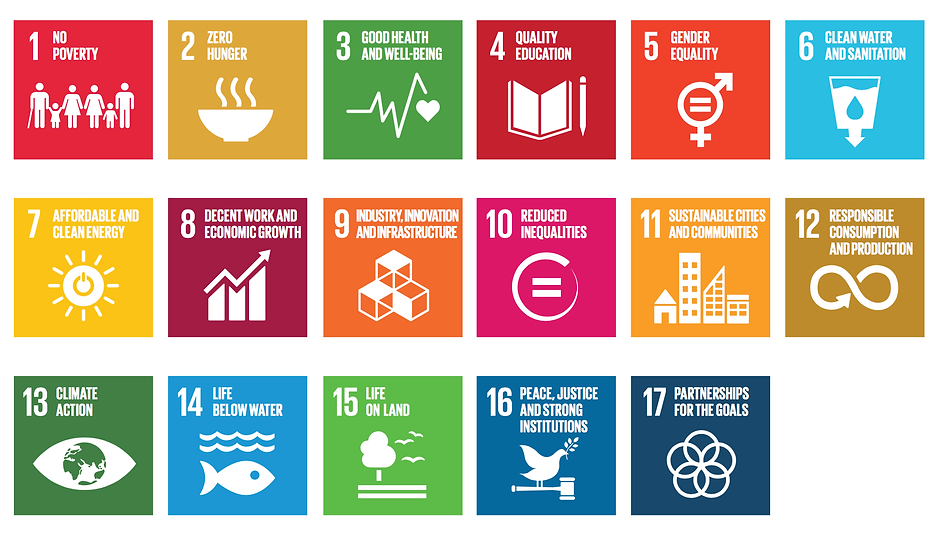A University of Hong Kong Capstone Project
Thought Exercise #1:
Sustainable Development Goals
Do these look familiar?

The 17 Goals (United Nations Department of Global Communications, 2020)
Ask Yourself
What does achieving these goals look like to you?
If a government or company were to achieve these, what would they do?
Keeping in mind your financial goals and budget, what kind of impact do you want to have with your investment?
If your answers are short, don’t worry. Your criteria may change as you reach different stages of life or receive new information. Any answer can be used as a starting point.
Thought Exercise #2: Sustainable Investment
Sustainable Investment: A Definition
The Global Sustainable Investment Alliance (GSIA), “an international collaboration of membership-based sustainable investment organizations,” proposes the following definition of sustainable investment:
“Sustainable investing is an investment approach that considers environmental, social and governance (ESG) factors in portfolio selection and management… [that] have emerged as a global standard of classification” (Global Sustainable Investment Alliance, 2018).

There are seven further “definitions” or approaches that can be used (Global Sustainable Investment Alliance, 2018).
ESG Strategies Chart (Eurosif, 2021)

1. Impact/Community Investing:
These can be further defined as "targeted investments aimed at solving social or environmental problems, and including community investing, where capital is specifically directed to traditionally underserved individuals or communities, as well as financing that is provided to businesses with a clear social or environmental purpose;” (Global Sustainable Investment Alliance, 2018)
Which products support the community, and how?
Exercise Questions
2. Corporate Engagement and Shareholder Action:
Also defined as "the use of shareholder power to influence corporate behavior, including through direct corporate engagement (i.e., communicating with senior management and/or boards of companies), filing or co-filing shareholder proposals, and proxy voting that is guided by comprehensive ESG guidelines” (Global Sustainable Investment Alliance, 2018).
Your interpretation of this definition may vary depending on the financial product you’re considering. For stocks, do executive management communicate transparently, regularly, and honestly? What do you hear about them on public news channels?
3. Sustainability Themed Investing: Are there any products which are known for being sustainable? In your opinion, what makes them sustainable? (for example, investments in sustainable agriculture)
4. Best In-Class: Are there any products you’d like to support because they align with your values? (ie. clean energy indices). Reading market news and company reports (for individual stocks) can assist an investor assess a product's ESG performance.
5. ESG Integration: During financial analysis, investors will systematically include the ESG factors below (Global Sustainable Investment Alliance, 2018) . Are any potential financial products taking action towards the ESG areas?
ESG Areas (PRI Association, 2021)

6. Exclusions: Are there any financial products you would avoid, because you feel they don’t support your values?
7. Norm-based Screening: This can include "screening of investments against minimum standards of business practice based on international norms, such as those issued by the OECD, ILO, UN and UNICEF;”
(Global Sustainable Investment Alliance, 2018) International norms can be found online – for example, the OECD lists international and sector-specific (ie. garment, agriculture) norms, such as avoiding child labour (OECD, 2018).

Thought Exercise #3: Sample Portfolios
If everyone chooses their own investment portfolio according to their individual tastes and risk tolerance levels, everyone will have a very different portfolio.
Through this green finance guide, we can show you where to find green financial products, and point you to Hong Kong and global leaders in sustainable investment, but you know what you want out of your portfolio.
To illustrate how a portfolio could be divided among multiple sustainable investments, we have included a link to the Sustainable Economist’s model portfolios website below, where you can view sample portfolios which have incorporated responsible investing principles.
The Sustainable Economist is operated by Tim Nash, an investment coach, founder of Good Investing, and a member of the Responsible Investment Association in Canada (Nash, 2021, RIA Canada, 2021). We are not affiliated with Mr. Nash nor are we deriving any income from this project.
References
-
EUROSIF 2021. ESG Strategies. LinkedIn: Leonie Kelly. Available: https://www.linkedin.com/posts/leonie-kelly-1077604b_esg-sustainablefinance-activity-6767322850459316224-Slqk [Accessed 18 February 2021]
-
GLOBAL SUSTAINABLE INVESTMENT ALLIANCE 2018. 2018 Global Sustainable Investment Review. The Forum for Sustainable and Responsible Investment.
-
NASH, T. 2021. Model Portfolios [Online]. Available: https://www.sustainableeconomist.com/model_portfolios [Accessed 15 January 2021].
-
OECD. 2018. OECD Guidelines for Multinational Enterprises [Online]. Organisation for Economic Co-operation and Development. Available: https://mneguidelines.oecd.org/guidelines [Accessed 1 February 2021].
-
PRI ASSOCIATION. 2021. What is responsible investment? [Online]. PRI Association. Available: https://www.unpri.org/an-introduction-to-responsible-investment/what-is-responsible-investment/4780.article [Accessed 1 February 2021].
-
RIA CANADA. 2021. Good Investing [Online]. Responsible Investing Association Canada. Available: https://www.riacanada.ca/company-profile/tim-nash/ [Accessed 1 February 2021].
-
UNITED NATIONS DEPARTMENT OF ECONOMIC AND SOCIAL AFFAIRS. 2021. The 17 Goals [Online]. United Nations Department of Economic and Social Affairs. Available: https://sdgs.un.org/goals [Accessed 30 January 2020].
-
UNITED NATIONS DEPARTMENT OF GLOBAL COMMUNICATIONS. 2020. GUIDELINES FOR THE USE OF THE SDG LOGO INCLUDING THE COLOUR WHEEL, AND 17 ICONS. [Online]. United Nations Department of Global Communications. Available: https://www.un.org/sustainabledevelopment/wp-content/uploads/2019/01/SDG_Guidelines_AUG_2019_Final.pdf [Accessed 30 January 2020].
